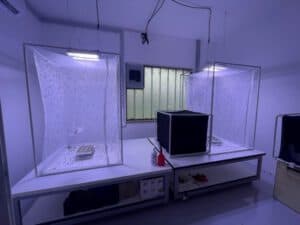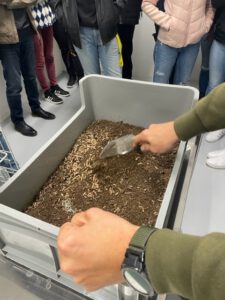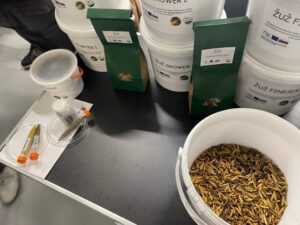In early November, the CEFOODCycle project, in collaboration with the Slovenian national EIP ŽUŽ project, conducted an interactive educational workshop. The workshop explored opportunities and viable systems for insect bioconversion. Over 40 participants attended the event, the majority of them stakeholders of Gorenjska CEFoodCycle HUB.
Insect bioconversion is a process in which insects, like black soldier flies, recycle organic waste. These insects eat food scraps or agricultural by-products and turn them into useful materials such as protein-rich animal feed or natural fertilisers. Insects eat organic waste during their larval stage. At this stage, they are highly efficient feeders, consuming large amounts of food scraps or agricultural by-products to grow quickly. Once they reach maturity and stop feeding, they can be harvested for use in various products like animal feed or fertilisers. Such natural cycles are a sustainable way to reduce waste and create valuable resources for farming and pet care.
In the introductory session of the training, a representative from the agricultural company Panvita introduced the company and its testing activities. Then, the new technologies and facilities for insect bioconversion were demonstrated—specifically, systems for the valorisation of by-products from plant production using insect bioconversion. These technologies have significant potential to provide alternative feed ingredients, reduce the environmental footprint of agricultural production, and strengthen the economic position of farms.
The Demo system trial involved rearing the breeding colony and larvae of the black soldier fly (BSF) in the intensive “Demo Panvita” system. It includes two breeding BSF colonies and is currently in its ninth cycle, with each cycle lasting about one month. For rearing the insects, substrates from agricultural by-products, such as corn grits, stale bread, tomatoes, and similar materials, were used. Barley malt from breweries, which is available year-round, showed poor results for rearing larvae.
The reproductive cycle of the black soldier fly was demonstrated in the breeding room. Pupated larvae are transferred to this room, where they develop into adult flies and lay eggs in specially prepared nesting boxes. Each egg-laying cycle produces 2–3 million larvae; 10,000–15,000 larvae are added to each substrate container. Flies die four days after emergence and must be regularly removed from the cages.
The visit continued to the feeding area, where participants observed different stages of the black soldier fly’s life cycle.
In conclusion, the results of a feed trial and a survey on consumer acceptance of this alternative chicken feed conducted by the Biotechnical Faculty of Maribor were presented.
The event also showcased market-ready products developed as part of the project, such as feed mix for broiler chickens, feed additive-insect oil, processed animal protein, food for terrarium animals and horticultural substrate with frass.
Insect bioconversion offers several key benefits to promoting circularity in the food sector.



For example:
- Waste Reduction: It efficiently recycles food waste, agricultural by-products, and other organic materials that would otherwise go to landfills, reducing the overall waste footprint.
- Resource Recovery: The process transforms waste into high-value products like:
- Protein-rich animal feed for livestock, poultry, and aquaculture.
- Fertilizers from insect frass (a nutrient-rich by-product of larval digestion).
- Reduced Environmental Impact:
- Diverts waste from landfills, lowering greenhouse gas emissions.
- Uses less land, water, and energy compared to traditional feed production like soy or fishmeal.
- Closing Nutrient Loops: Nutrients from organic waste are returned to the food production cycle in the form of feed and fertilisers, creating a more sustainable system.
- Support for Sustainable Protein Sources: Insect-based feed reduces reliance on unsustainable protein sources like overfished oceans or deforested soy fields, helping preserve ecosystems.
- Economic Opportunities: Provides new revenue streams for farms and food producers through waste valorisation and alternative feed production.
By turning waste into valuable resources, insect bioconversion exemplifies a circular economy model, minimising waste and maximising resource efficiency in the food sector.



